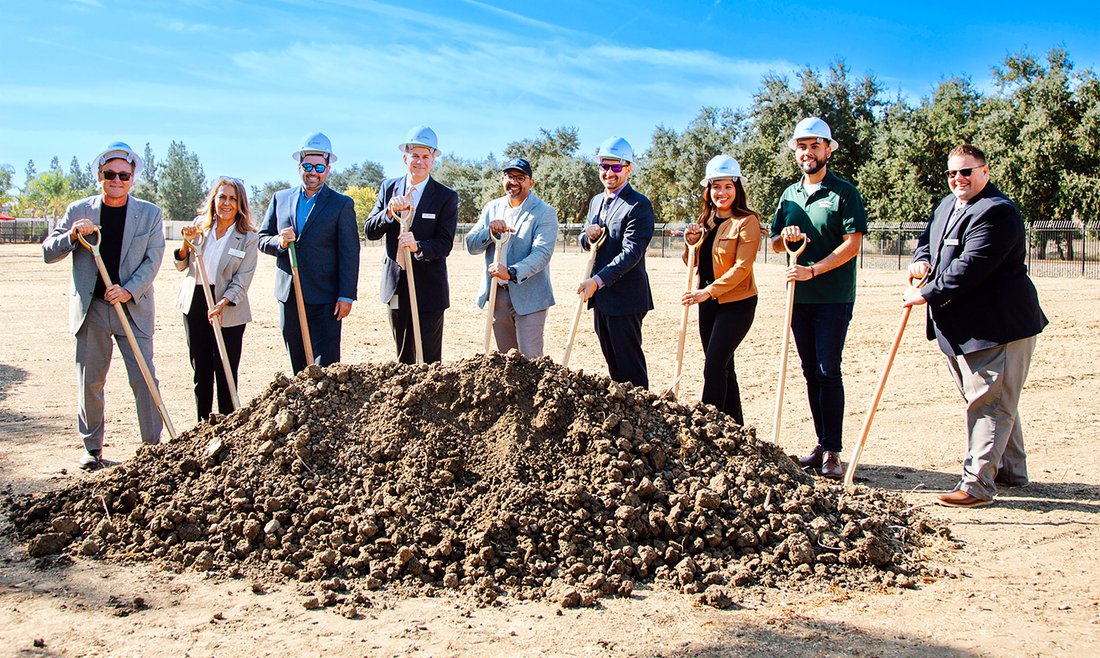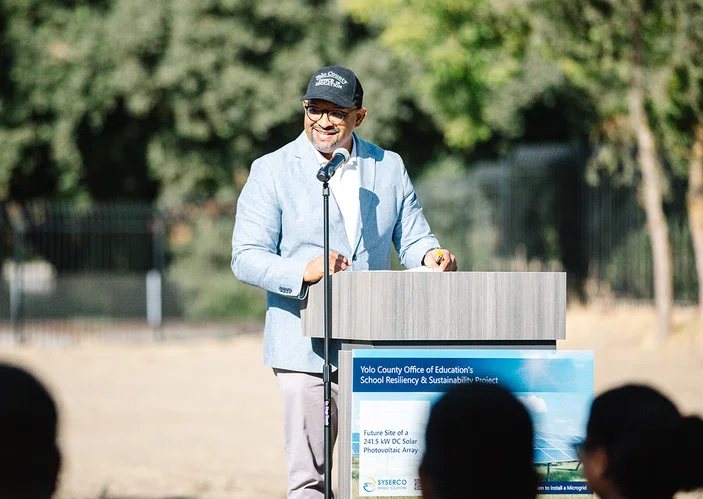
A groundbreaking event was held Aug. 23 to commemorate the start of Yolo County Office of Education’s Schools Resiliency and Sustainability Project. (Photos by Stanislava Georgieva for Stani Photography)
County office breaks ground on sustainability initiatives
Yolo moves forward with plans to operate its own independent microgrid
October 28, 2024
The Yolo County Office of Education has launched a groundbreaking project for energy conservation, making it the first county office of education in the United States to move forward with plans to operate its own independent microgrid.
After five years of planning, the county office’s Schools Resiliency and Sustainability Project officially began with a groundbreaking event Aug. 23. The estimated $4.8 million project will be implemented at six locations and consists of 12 different energy conservation measures and improvements, including the microgrid. By implementing these solutions, YCOE seeks to ensure uninterrupted power supply, reduce carbon footprint, and provide valuable learning opportunities for students about renewable energy and environmental stewardship.
“This project will not only move our agency toward complete sustainability in how we consume energy, but it will also save us millions of dollars in the long term,” said Yolo County Superintendent of Schools Garth Lewis. “By avoiding the ever-increasing utility costs, we can pass these savings along to the classroom. The project also aligns perfectly with our mission, which involves being a model of excellence in educational service, innovation and impact.”
With the system, YCOE estimates generating a net savings in energy costs of more than $7 million over 20 years, and nearly $10 million over the life of the system. Completion is projected for 2026.
Central to the project is the independent microgrid, a small-scale power grid that can operate independently or in conjunction with the main grid, offering numerous benefits to educational institutions. Microgrids enhance energy resilience by providing backup power during outages, reduce electricity costs through optimized energy management, and promote environmental sustainability by integrating renewable energy sources such as solar power.
YCOE has partnered with the team at Syserco Energy Solutions to design the microgrid system that includes renewable solar energy, a battery energy storage system, and advanced energy management technology, all tailored to meet the unique needs of YCOE’s facilities.
“This microgrid will not only provide reliable, clean energy but also set a precedent for other educational institutions across the state and beyond,” said Scott Meinzen, vice president at Syserco Energy Solutions. “It is a testament to YCOE’s leadership in adopting innovative solutions that benefit both the environment and the community. Together, we are creating a model for how educational facilities can achieve energy independence and sustainability, paving the way for a greener future.”
Another key highlight of the project is the installation of state-of-the-art solar arrays as part of the microgrid system at three designated sites within Yolo County, including YCOE’s administration facility in Woodland. The microgrid, which will also include four electric vehicle charging stations, will not only ensure uninterrupted power supply to YCOE’s various sites, but also move the agency toward net-zero energy usage for its buildings, and serve as a living laboratory for students to explore concepts related to energy generation, distribution and conservation.
“Our project encapsulates more than just an upgrade; it’s a leap into the future of energy efficiency and a greener world,” said Matt Juchniewicz, director of Support Operations Services. “By extending the life of HVAC systems and preparing for the shift to electric vehicles, we ensure that our facilities remain cutting-edge and sustainable. Our commitment to electrification is about more than just energy — it’s about setting a standard for operational excellence and anticipating the needs of tomorrow.”
In addition to the microgrid installation, the Schools Resiliency and Sustainability Project includes other improvements to energy infrastructure, such as the replacement and electrification of HVAC units that would be powered through the microgrid output, automated energy systems and controls, and technology designed to improve indoor environments including the installation of CO2 sensors to improve classroom air quality.
“Yolo County Office of Education is the very first county office of education in the state and country who will be leveraging Inflation Reduction Act Tax Credits to transition to sustainable, resilient, efficient, cost-effective infrastructure,” said Stephanie Seidmon, program director for UndauntedK12, an organization that promotes the potential of America’s K-12 public school sector to respond to the challenge of climate change. “We believe that their innovation and leadership will inspire more schools to use this uncapped, noncompetitive funding source to drive sea change and are excited about the cascading benefits this project will bring to Yolo County and beyond.”
Once complete, the annual reduction in greenhouse gases from the conservation projects is equivalent to electricity use in 91 U.S. homes or 1,204,408 miles driven by gas-powered vehicles.
For more information about the Schools Resiliency and Sustainability Project and other initiatives by Yolo County Office of Education, please visit www.ycoe.org.

Garth Lewis, Yolo County Superintendent of Schools. (Photos by Stanislava Georgieva for Stani Photography)





